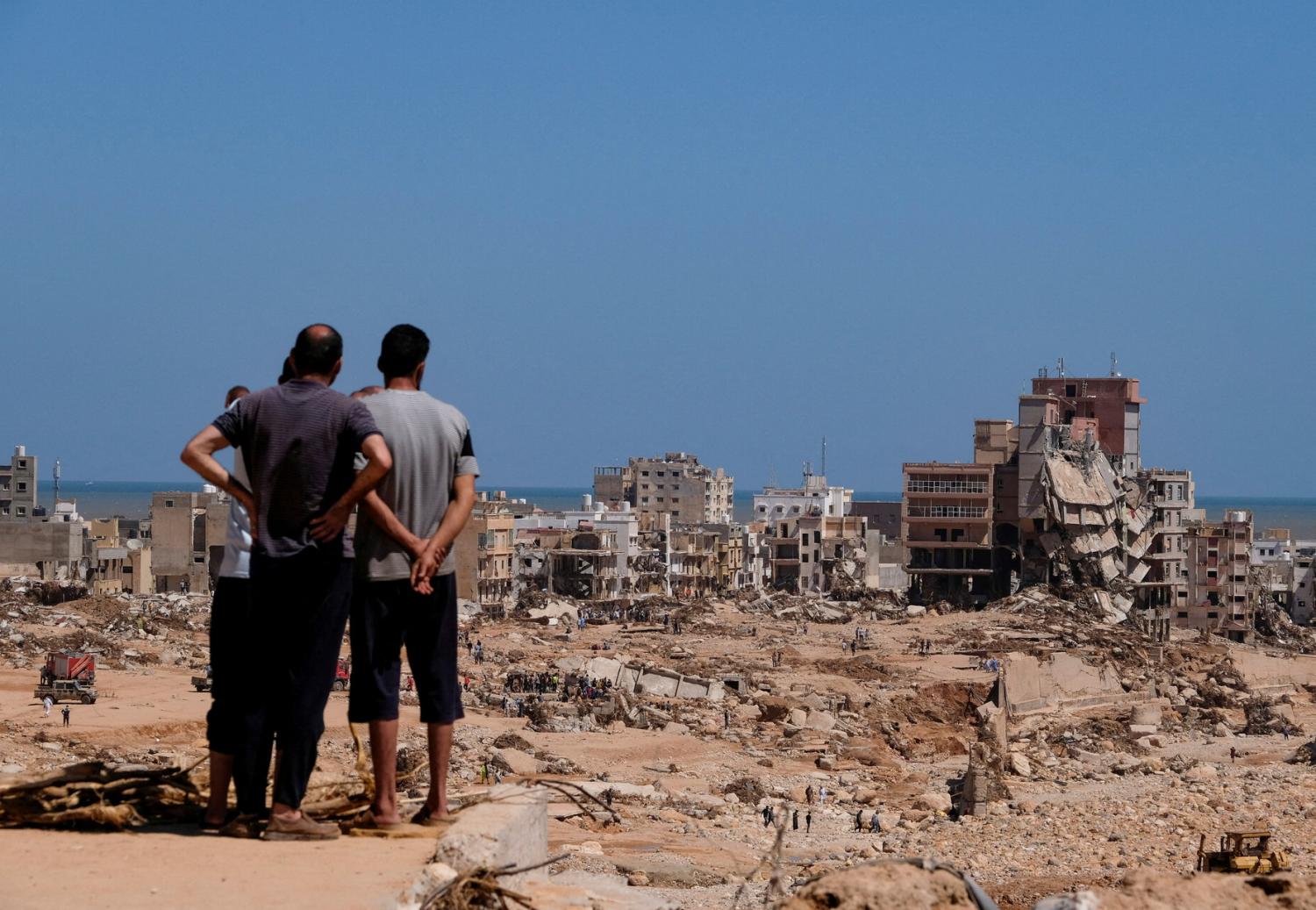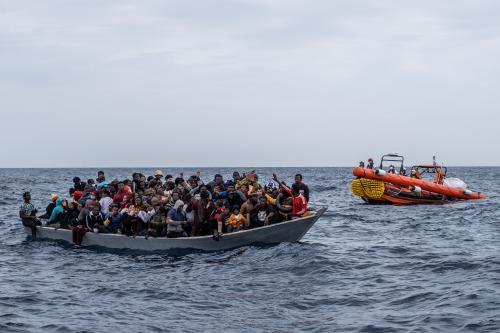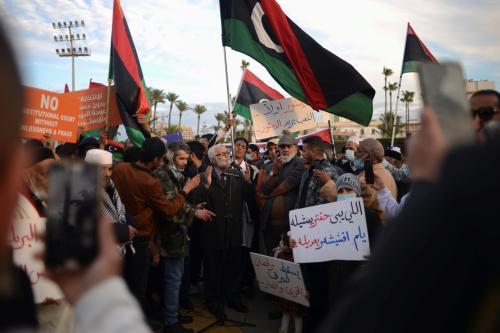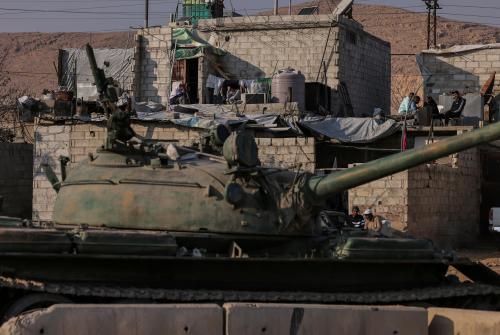This essay is part of the “Development, governance, and security in the Middle East: Obstacles and opportunities” project, a series examining how governance failures in the Middle East and North Africa have hindered stable development and human security, in partnership with the Japan International Cooperation Agency.
Some 17 months ago, in the early hours of September 11, 2023, thousands of residents of the quaint port city of Derna, nestled at the foot of the Jabal al-Akhdar (the Green Mountains) on Libya’s eastern coast, were washed out to sea by catastrophic flooding caused by Storm Daniel and the collapse of two dams that had been built in the 1970s during Moammar Gadhafi’s regime. So great was the devastation and the loss of life that to date, thousands of bodies remain unrecovered and the death toll could well be close to 20,000; another 40,000 people were displaced (out of an overall city population of 90,000). I can find no better words to describe the tragedy than those spoken by my former boss, United Nations Secretary-General António Guterres, when he mourned the loss of so many innocents: “They were victims many times over. Victims of years of conflict. Victims of climate chaos. Victims of leaders – near and far – who failed to find a way to peace. The people of Derna lived and died in the epicenter of that indifference – as the skies unleashed 100 times the monthly rainfall in 24 hours – as dams broke after years of war and neglect … as everything they knew was wiped off the map.”
This essay intends to use the Derna tragedy and its lessons to cast light on Libya’s long-running governance crisis and to propose a way forward. It is reasonable to ask whether Storm Daniel’s unusual magnitude would have caused death and destruction regardless of the state of Derna’s dams—that this was an act of nature, a freak storm of the kind we have increasingly witnessed as global warming wreaks havoc on the planet. Yet, this is at best a partial explanation, and it therefore cannot obscure the fact that there were other factors at play, explanations that are rooted in Libya’s history and its present. I have identified five factors that led to the dreadful outcome in Derna: the legacy of statelessness left by Gadhafi; the historic marginalization of populations on Libya’s periphery; post-2011 conflicts and the irresponsibility of the current ruling class; the overall lack of political accountability; and the international community’s indifference.
From the onset, I wish to note that in my capacity as a U.N. mediator, I endeavored to avoid the inevitable reductionist narratives surrounding the Libyan conflict, such as the facile proposition that the 2011 revolution led to the division of the country into two parts. Rather than a split, what occurred in 2011 was a full-scale and deep societal implosion, resulting in the atomization in which Libya has languished. Therefore, as a mediator, I believed that my primary task was to try to somehow reassemble all those fragments into a coherent whole. Indeed, some kind of societal cohesion is a vital ingredient for state-building. No less important is a common national identity. Both are absent in today’s Libya. Following Gadhafi’s demise, the grinding conflict in Libya has produced a bitter and unresolved contest over which Libyan figure has the capacity to assume the dictator’s two most salient qualities: his monopoly over the use of violence and his role as the (capricious) allocator-in-chief of the country’s vast riches.
Gadhafi’s legacy: An enduring statelessness
In assessing the Libyan governance conundrum through the lens of the devastating Derna flood, the first factor to consider is the glaring absence of a strong, representative, and capable state, the achievement of which has eluded Libyans for many years. Indeed, a state (re)building project presumes the existence of a strong state prior to the upheaval in 2011. In fact, as scholars such as Dirk Vandewalle in his book “A History of Modern Libya” have noted, what characterized both the Sanussi monarchy (1951-1969) and the Gadhafi (1969-2011) eras was something much closer to statelessness than a state in the modern sense of the word.
Following the nascent and unfinished institution-building efforts of the short-lived monarchy, Gadhafi—who disingenuously labeled himself as the “Brotherly Leader” or “Guide of the Revolution”—engaged in a 42-year experiment dedicated to the centralization of power and state deconstruction, epitomized by his frequent upendings of the status quo and declarations of one “revolution” after another, not to mention his swings from pan-Arabism to pan-Islamism and finally, pan-Africanism. The net effect of these eccentric and theatrical perturbations was to keep Libyans off-balance, distrustful of each other, and perpetually in a state of flux and insecurity. To the extent that there were institutions during the tumultuous Gadhafi period, they were penetrated by a coterie of regime loyalists, fellow tribesmen, and their allies. Gadhafi also built a powerful internal security and intelligence system, ruthlessly punishing those who questioned his rule. All of this turmoil had a direct impact on the building and maintenance of critical infrastructure, such as the dams in Derna, which were originally built in the 1970s but whose structural weaknesses were identified in the early 2000s. The regime waited for five years to address the maintenance issues and then got caught up in the maelstrom of the 2011 revolution.
In the euphoria that accompanied Gadhafi’s ouster in 2011, his Libyan successors and their foreign backers failed to adequately tackle the ‘day after’ challenge.
In the euphoria that accompanied the dictator’s ouster in 2011, his Libyan successors and their foreign backers failed to adequately tackle the “day after” challenge, which is not an easy task given authoritarian regimes’ tendency to capture institutions. The regime’s collapse rendered what was left of those institutions entirely brittle and vulnerable to predation by armed actors. This lack of institutional “puissance” (or power) continues to plague Libya today.
At the same time, the vengeful 2013 Political Isolation Law did not help in ensuring some continuity as it cast even minor “regime” officials (including those who had publicly and bravely joined the opposition) into purgatory and alienated many others who could have helped with the state-building task. The absence of meaningful disarmament, demobilization, and reintegration and security sector reform efforts further contributed to the chaos that ensued, causing the ranks of the “revolutionaries” to swell from 30,000 to 300,000 personnel by the time I arrived in Libya in 2018.
In the years following Gadhafi’s downfall, the logic of perpetual conflict and the resort to arms soon overtook the pursuit of state and institution building. The state-building task, such as it existed, was assigned internationally to a United Nations political mission that often lacked the resources and personnel to tackle Libya’s unique set of issues. Furthermore, for four and a half years, between mid-2014 and early 2019, due to ongoing conflict and instability in Libya, the U.N.’s international personnel were based in Tunisia. Places like Derna were entirely beyond our reach in this period, not to mention Libya’s south, which had fallen into the hands of extremist groups and thugs engaged in every type of illicit trade imaginable.
During my nearly four years working on Libya, from early 2018 through mid-2022, I would struggle to identify Libyan officials who were interested in any state-building exercise that would impede their ability to plunder and engage in patronage politics. The prime minister’s office was staffed by 900 people but only a few of these officials made any decisions. On the other side of the country, former CIA asset Khalifa Haftar had launched his own project, building a military machine to seize control of the capital and render the “state” a mere appendage to his decidedly authoritarian project. As for the rest of the international community, it did not appear to be prepared to invest much in what would be a painstaking, tedious, and long-term institution-building process. Instead, it seemed to have been converted to the paradigm of “stabilization” and the containment of issues such as terrorism and migration rather than the harder task of state-building.
Geography as destiny
The second factor that contributed to the Derna tragedy was the city’s geographic location, on Libya’s periphery, at a considerable distance from the capital and even far removed from the eastern region’s largest and most important city, Benghazi. So, it is the case that state-building, and the promotion of good governance, must also take into account Libya’s geography. Many of Libya’s cities and municipalities are located far away from Tripoli, the country’s capital, which is located some 1,000 kilometers (621 miles) to the west of Benghazi. In addition, a good number of Libya’s far-flung municipalities are inaccessible due to inadequate road maintenance and persistent insecurity. Given the limited writ of the successive U.N.-recognized governments, even towns closer to Tripoli complained about not receiving adequate resources. The resentment of the Tripoli armed groups’ monopoly over vital institutions stoked the mini-war on Tripoli that took place in August 2018 when forces from Misrata and Tarhouna attacked. The consistent marginalization of these non-Tripoli communities is a conflict driver and has produced calls for secession or a return to the federalist model that characterized the state in its first 12 years before the 1951 constitution was amended toward a centralized model in 1963.
Gadhafi’s frequent bureaucratic eruptions and his internal security forces’ brutality further frayed ties within and among communities near and far, sowing a great deal of mistrust, the resonances of which are still felt today. Marginalization, corruption, misgovernance, and repression have fed extremism in Libya. When a faraway city like Derna was identified as an extremist hotbed, it became the target of further repression, its citizens punished and neglected during the Gadhafi era and in recent years following the outbreak of violence in eastern Libya in 2012. When I visited the city in the summer of 2019, after Haftar’s forces had “cleansed” it of extremists, its downtown area was totally demolished, reminding me of what was left of Mosul, Iraq, in the summer of 2017 after the Islamic State group was defeated. Due to conflict, distance, and neglect, the Derna dams and other critical infrastructure had not been tended to in decades, rendering the citizens of the coastal town entirely vulnerable in the event of serious flooding. Indeed, other communities are equally vulnerable to catastrophic weather events; last year’s heavy rains produced historically devastating floods in the southern Libyan towns of Ghat and Al-Kufra.
A quarrelsome ruling class that sometimes takes its quarrels to the streets
The third factor that contributed to the Derna catastrophe was the incessant quarreling among members of Libya’s ruling class, which has produced nothing beyond 10 years of divided government, persistent dysfunction, and occasional bouts of violence. This broken political model has hampered the executive’s ability to respond to fast-breaking events and has stifled the fostering and development of experts and technocrats whose skills are desperately needed to address the country’s many challenges, including the effects of climate change and Libya’s overreliance on fossil fuels. Instead, the ruling class has prioritized patronage politics, battles over the shallow legitimacy of the remaining institutions, and the nepotistic appointing of relatives to important positions.
For instance, Derna’s mayor at the time of the epic 2023 storm just happened to be the nephew of parliamentary head Aguila Saleh, which seems to have been his only qualification for the job. It, therefore, comes as little surprise that responsibility for Derna’s reconstruction was handed to one of Haftar’s sons. Meanwhile, across the country in Tripoli, the head of the U.N.-recognized government, Abdul Hamid Dbeibah, has granted extraordinary access and power to his cousin Ibrahim. While they disagree on almost everything and went to war in 2014 over the results of parliamentary elections, Libya’s political class is in absolute alignment on one matter: to maintain the status quo which enables it to continue to access the state coffers.
A recent manifestation of ruling class quarreling was last year’s food fight over the management of Libya’s most prized sovereign institution, the Central Bank of Libya, which fully erupted in August 2024. The internationally-recognized governor, Sadiq al-Kabir, had held the position for 13 years, during which time the board of governors rarely met, if at all, with the governor monopolizing all fiscal and monetary decisionmaking. When his relations with the Tripoli authorities soured, Kabir turned his sights east, funding the rival government operating under Haftar’s thumb. This spurred the Tripoli-based presidential council (PC) to summarily dismiss the governor, plunging Libya into a full-fledged and dire economic and financial crisis. The PC pushed the country ever closer to the abyss by not adhering to the 2015 Libyan Political Agreement’s strictures on the selection of sovereign positions (a decision that is monopolized by the country’s two dysfunctional and usually dueling legislative bodies), and by not respecting the narrow authorities granted to them by the 2021 Libyan Political Dialogue Forum. Thanks to adept U.N. mediation, the central bank crisis was resolved, but the underlying causes of the rivalry over control of vital institutions remain untreated.
The post-Gadhafi ruling class has consistently preferred to continue cutting the cake, playing musical chairs, and engaging in endless “muhassasa,” or power-sharing arrangements.
Effective state-building and good governance require a degree of national consensus on what kind of state citizens desire and their relationship to those who govern them. This is not helped by the fact that almost 14 years after Gadhafi’s demise, Libya still lacks a constitution that determines the nature of the state—whether it is a centralized or decentralized model, whether it is a presidential system or a mixed presidential-parliamentary one—the relationship between the citizen and the state, and importantly, how the country’s resources are apportioned and managed. Rather, the post-Gadhafi ruling class has consistently preferred to continue cutting the cake, playing musical chairs, and engaging in endless “muhassasa,” or power-sharing arrangements.
A gaping lack of accountability
A related fourth factor that caused that huge loss in Derna is Libya’s gaping absence of accountability. Good governance requires accountability. Accountability is also needed to check the endemic corruption, abuses of power, and flagrant violations of basic human rights that have plagued Libya for the last 50-plus years. The rule of law rather than the rule of the gun must prevail. Too often, it is the small fry, the minor officials, who are arrested and held for abuses of power or stealing from the public treasury. Meanwhile, the real predators, those who engage in patronage politics, wholesale plundering, organized crime, and crony capitalism, remain at large, free to continue forging their dirty deals. In the case of Derna, in a decision shrouded in mystery, 12 unnamed civil servants were reportedly given prison sentences for their role in the dams’ collapse.
One form of accountability should normally come through the ballot box. However, as I can attest, it is much easier to talk about elections in Libya than it is to produce them. The members of the ruling class, desperate to hold on to power, have buried the elections project by refusing to allow advancement on the constitutional process and the required (and consensually agreed to) electoral laws, and they and their institutions are now entirely bereft of popular legitimacy. Elections are surely not a panacea, and if the conditions are not ripe, they can lead to further conflict, as was the case 10 years ago. However, it is also clear that the pursuit of an electoral process in Libya is absolutely key in order to remind the current legislators, who have been in power for more than 12 and 10 years respectively, that over 3 million of their compatriots have consistently demanded the right to democratically and regularly elect their representatives.
An inclusive political process that goes beyond the same old faces and that incorporates the full panoply, richness, and diversity of the Libyan body politic is being relaunched by the United Nations and deserves the full support of Libyans and international actors. We came rather close to such a formula first in 2018 and 2019 with the building of the National Conference, the holding of which was aborted by Haftar’s attack on Tripoli. Then, in 2020, after the guns were silenced and we in the U.N. facilitated the signing of the nationwide ceasefire agreement, we convened the Libyan Political Dialogue Forum (LPDF), an inclusive gathering, to produce a detailed and time-bound roadmap that resulted in the formation of an interim government and a call for elections. The nationwide ceasefire continues to hold but the LPDF’s lofty goals have yet to be achieved. Unfortunately, many in the international community mistook the congeniality that accompanied that political agreement in early 2021 for a true desire to push forward the electoral project. Using the pretext of “respecting” Libyan sovereignty, the international community allowed the LPDF roadmap to be cynically abandoned, and decisionmaking was returned to the hands of the very architects of the political stalemate.
Yet, the lesson that should be taken from the LPDF experiment is to continue with an inclusive approach. Under no circumstances should the international community return to the days of gathering two or five guys or their representatives in a smoke-filled room. It is the triumph of hope over experience to believe that these cynical status quo actors—who spar during the day and collude at night—are interested in the kind of meaningful change that Libya so desperately needs.
In fact, conflict settlement in a rentier economy comes with its own set of challenges. This is particularly true in the case of Libya, where one man had served for 42 years as the allocator-in-chief, using his vast intelligence and security apparatus as enforcers in apportioning the country’s wealth among its different constituencies. For some years after 2011, the international community prized maintaining the autonomy and integrity of the country’s sovereign financial and economic institutions. Therefore, the politicization of the National Oil Corporation since 2022 is an alarming development that has accelerated fuel smuggling and further deprived the average Libyan of the benefits that should accrue from being a citizen of one of Africa’s largest oil producers. Until last year’s leadership crisis, the central bank had fared better, but it has yet to fully enact the recommendations of the U.N.-facilitated financial review to regularly hold meetings of the board of governors, display the utmost transparency, and further unify the institution.
Enjoying equal levels of impunity are those who have committed atrocious human rights abuses, including the wholesale slaughter and burying of innocents in the mass graves of Tarhouna, as well as enforced disappearances, suspicious deaths (such as falling out of windows), arbitrary detention, and the trafficking of migrants—helpless souls, like the people of Derna, who have met their watery death when trying to cross the Mediterranean Sea. Far too often, the victims of this avalanche of abuse have been women, whether public figures such as human rights activists and advocates like Salwa Bugaighis and Hanan al-Barassi, both brutally murdered in Benghazi, or former General National Congress member Fariha Barkawi, who was assassinated in Derna. To this day, no one has been held accountable for these crimes as well as for the enforced disappearance of parliamentary member Siham Sergiwa, who was violently abducted from her home in Benghazi in July 2019 by armed actors believed to have been loyal to Haftar’s forces. I hope that the International Criminal Court’s (ICC) chief prosecutor continues to move with alacrity on the Libya file. Justice delayed is justice denied.
An indifferent “international community”
The fifth and an equally important factor causing the Derna tragedy was, as the U.N. secretary-general so eloquently noted, the appalling indifference of the so-called international community. These actors have consistently failed to hold accountable those responsible for the many abuses and excesses, instead prioritizing the pursuit of their own bilateral agendas over the need to help the Libyan people build a functional and accountable state. In the case of Derna, I recall the stony silence we heard when we would report to the U.N. Security Council on the terrible human rights abuses committed during the siege of that city by Haftar’s forces.
Even worse, those responsible for spoiling U.N. political processes, in 2019 and in 2021, have been rehabilitated and rewarded for their destructive behavior rather than marginalized. In this project, some countries have elevated the counterterrorism agenda above all other bilateral priorities. While no one can really dispute the need to pursue U.N.-designated terrorist groups, too often the counterterrorism agenda requires the alignment of international actors with domestic Libyan hybrid armed groups who have no interest in the state-building project, not to mention the concept of good governance. The same is true of those countries that have prioritized the counter-migration file above nation-building. Today we witness the cynical wielding of the migration file by actors across the southern Mediterranean, threatening to turn the migrant pipeline on or off depending on the level of material or political support received from European leaders. A recent example of this hypocrisy was the Italian government’s decision to return a known human rights abuser to Libya instead of complying with an arrest warrant from the ICC.
And then there are those countries that have carelessly used Libya as a battlefield for their ideological disputes, raising the bogeyman of political Islam or trying to impose an authoritarian model in order to suppress any move toward democracy in the Middle East and North Africa. In these proxy wars, it is unfortunately the case that Libyan actors have been full participants, inviting in tens of thousands of foreign mercenaries and allowing foreign forces, the majority of whom today are supplied by Russia and Turkey, to occupy bases throughout the country. These and other countries have poured weapons and lethal systems into Libya, a country that was already awash in weapons from the 2011 and 2014 wars, in full violation of the U.N. arms embargo. At one point in the 2019 to 2020 war, Libya became the largest arena of drone warfare in modern history. (That record has now been shattered since Russia’s full-scale invasion of Ukraine in 2022.)
The alarming facts on the ground, which are represented by the many foreign-occupied bases, will be very difficult to unwind, particularly in the absence of a fully sovereign, representative, and united Libyan government. The stark reality is that Russia and Turkey have effectively divided Libya into zones of influence, each using the country to pursue wider geostrategic objectives, whether in the Sahel and Central Africa or to extract resources and pursue commercial deals. Since the ouster of Syrian dictator Bashar al-Assad in December 2024 and with Haftar’s acquiescence, Russia has increased its footprint in North Africa, shifting assets from its naval and air bases in Syria to eastern and southern Libya. In addition to maintaining its toehold in Libya and projecting power in Africa, Russia’s ancillary goal is to put pressure on and destabilize southern Europe by leveraging the migrant pipeline. Needless to say, all of this negative foreign interference further renders the state-building and good governance project exceptionally difficult.
Decentralization as a path forward
Having outlined five governance-related factors (and no doubt there are more) that I believe contributed to the Derna tragedy, I believe we can best honor the memories of Storm Daniel’s victims by pressing forward. We must start somewhere, and I would modestly propose that more focus should be put on local, grassroots, and community-led efforts. Already, good work has been done in this regard by local Libyan groups like the Peacemakers and ad-hoc coalitions of political parties and other gatherings. In fact, there is widespread consensus among Libyans about the need to devolve power from the center in pursuit of an enhanced decentralized model that would put more power and resources in the hands of local constituencies.
During the planning process for the aborted 2019 National Conference, during which the Centre for Humanitarian Dialogue conducted 77 meetings with over 7,000 Libyans inside and outside Libya, participants agreed that “an overly centralized government is widely seen as having caused many of the problems Libya is experiencing today.” Therefore, they recommended that “there should be a gradual transfer of a significant portion of ministerial responsibilities to municipalities and, eventually governorates.” As an interim measure, and pending a more durable solution, the current decentralization law, Law 59, which was passed in 2012, should be fully implemented. In 2022, the constitutional negotiations I facilitated between the two legislative chambers resulted in an agreement on the establishment of 13 governorates—using the existing 13 electoral districts—along with the precise division of resources at the central, provincial, and local levels. Some have argued for the establishment of elected chambers at the three levels: a national parliament and higher chamber, elected provincial legislative bodies, and elected municipalities.
In fact, since 2011, the majority of Libya’s municipal councils have been elected, with the exception of some councils in eastern and southern Libya whose elected members Haftar replaced with loyal appointees. The election of municipal councils represents important green shoots of democracy in an otherwise arid environment. The U.N. helped the elections commission to organize council elections throughout the 2019-2020 conflict and even during COVID-19. It is heartening to see that municipal elections took place in 2024, accompanied by a surge in voter registration.
Decentralization in Libya will give greater autonomy and authority to local officials and, with it, greater accountability.
For all of these reasons, the move to a more devolved model must be pushed. It will lessen the pressure on Tripoli, reducing its vulnerability to constant attack. Decentralization will give greater autonomy and authority to local officials and, with it, greater accountability. The knock-on effects of devolution could be realized in the pursuit of local disarmament, demobilization, and reintegration efforts. A variety of studies point to the fact that Libya’s armed groups are by no means monolithic and that many are well integrated into their local communities. These communities will know best how to reintegrate and rehabilitate those who have resorted to arms, helping them to turn swords into plowshares.
At this moment, when we are seemingly at a hinge in history, faced with the threatened redrawing of the global order and when international institutions are under threat—even from the very architects of that order—we must continue to work on solving conflicts like the one in Libya. Libya is a country that has enormous talent and capable citizens—women and men alike—who have their hands extended and their hearts open to each other, and who want to build themselves a viable state. The best way to honor those whose lives were tragically cut short in Derna is to neither give up nor give in.
In Partnership With
The Brookings Institution is committed to quality, independence, and impact.
We are supported by a diverse array of funders. In line with our values and policies, each Brookings publication represents the sole views of its author(s).






